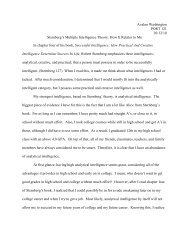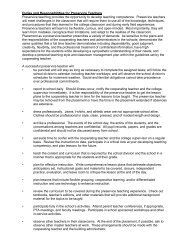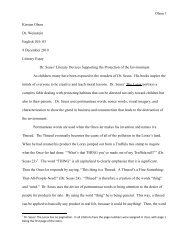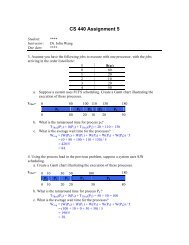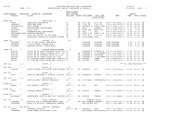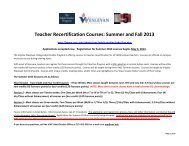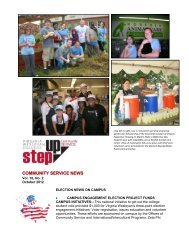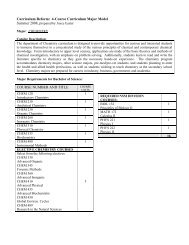2008-2009 Catalog - Virginia Wesleyan College
2008-2009 Catalog - Virginia Wesleyan College
2008-2009 Catalog - Virginia Wesleyan College
- No tags were found...
You also want an ePaper? Increase the reach of your titles
YUMPU automatically turns print PDFs into web optimized ePapers that Google loves.
60 BIOLOGY300 Plant Morphology (4)A morphological and evolutionary study of plants frombacteria to flowering plants. Designed to give the student aview of the structure and modes of reproduction of plants.Prerequisites: a grade of C or better in BIO 132 or consent.Lecture three hours, laboratory three hours each week.Offered spring of odd-numbered years.311 Genetics (4)Principles of heredity as applied to both plants andanimals. Prerequisites: CHEM 105 or 117 and a grade of Cor better in both BIO 131 and 132 or one year of generalbiology. Lecture three hours, laboratory three hours eachweek. Offered each semester.316 General Ecology (4) WA study of plant and animal communities in relation tohabitat with emphasis on the effect of the environment oncommunity structure and distribution. Prerequisites: BIO131 and 132 or one year of general biology or 207. MATH106 is recommended. Lecture three hours, laboratory/fieldthree hours each week. Offered each fall.332 Taxonomy of Vascular Plants (4)Emphasis is on the classification and identification ofthe plants of southern <strong>Virginia</strong>. The characteristics of themajor families of plants of North America are discussed.Prerequisites: a grade of C or better in BIO 132 or consent.Lecture three hours, laboratory three hours each week.Offered spring of even-numbered years.355 Marine Biology (4)A study of organismal adaptation and communityorganization in marine and estuarine habitats. A variety ofmarine habitats, with the laboratory primarily focusing onlocal species and habitat types is examined. Prerequisite:one year of general biology or BIO 207. Offered each fall.370 Vertebrate Zoology (4)A comparative study of the morphology, life histories,and evolutionary relationships of the major vertebratelineages. This course includes laboratory examinations andfield observations of representative vertebrate animals.Prerequisite: BIO 131. Lecture three hours, laboratory threehours each week. Offered on demand.371 Histology (4)Features a detailed study of the cells, tissues, and organsthat comprise the mammalian body. It is especiallyintended for students seeking careers in biology, medicine,or veterinary sciences. Prerequisite: grade of C or better inBIO 131 or consent. Lecture three hours, laboratory threehours each week. Offered on demand.372 Comparative Anatomy (4)A study of the evolution, morphology, and physiologyof vertebrates. An intensive laboratory directed examinationof the major organ systems of vertebrates as exemplified bythe lamprey, dogfish, salamander, and cat is featured. It isintended for students seeking careers in biology, medicine,or veterinary sciences. Prerequisite: BIO 131 with a grade ofC or better or consent. Lecture three hours, laboratory threehours each week. Offered on demand.373 Invertebrate Zoology (4)A survey of the invertebrate phyla, with a focus on theclassification, evolution, ecology, morphology, and lifehistories of these organisms. This course includes laboratoryexaminations of representative groups and field sampling oflocal invertebrate fauna. Prerequisite: BIO 131. Lecturethree hours, laboratory three hours each week. Offered fallof odd-numbered years.375 Topics in Tropical Biology (3) WFeatures an intensive field experience in neotropicalecosystems (e.g., sea caves, mangrove swamps, coral reefsand rainforests). Descriptive field studies of representativeplants and animals is required. Field activities requirestrenuous exercise and considerable hiking. Destinationsmay include Trinidad, Belize, Costa Rica, U.S. VirginIslands, or the Galapagos Islands. Prerequisite: a grade of Cor better in BIO 131 and BIO 132 or BIO 207, andconsent. Lab fee. Offered summer on demand.380 Comparative Animal Physiology (4)A study of the basic mechanisms by which differentanimals function. Emphasis is placed on how organisms,both invertebrates and vertebrates, make changes in thesebasic mechanisms to deal with differing environmentalconditions. Prerequisites: a grade of C or better in BIO 131or consent. Lecture three hours, laboratory three hours eachweek. Offered on demand.384 Developmental Biology (4)Focuses on the process by which organisms grow anddevelop. Emphasizes principles and concepts that governdevelopment in model organisms such as sea urchins,flatworms, fruit flies, zebra fish, and chickens. Regenerationof appendages, stem cells, cancer and plants are discussed.Prerequisite: BIO 311 or consesnt. Offered fall of evennumberedyears.385 Animal Behavior (4)A study of the mechanisms and evolution of animalbehavior. Topics include genetics and development ofbehavior, neural and physiological mechanisms of behavior,communication, social behavior, habitat selection,reproductive behavior, and parental investment. Laboratoryexercises provide hands-on experience for many of theseconcepts. Prerequisites: BIO 131 or consent. Lecture threehours, laboratory three hours each week. Offered ondemand.



